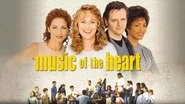Paul J. Nemecek
Music of the Heart is pretty predictable. If you've seen Goodbye Mr. Chips, To Sir With Love, Educating Rita, Dead Poet's Society, Dangerous Minds, and/or Mr. Holland's Opus you pretty much know what to expect. What is a little unexpected is that this inspirational and moving film is directed by screammeister Wes Craven (Scream, Nightmare on Elm Street, etc., etc., ad infinitum, ad nauseum). Even though the story has been told before this is based on the true story of a woman struggling to teach violin in East Harlem. Meryl Streep plays Roberta, a mother with two children, who has been deserted by her husband. A friend encourages her to apply for this teaching job and the rest of the story is fairly predictable.In spite of its predictability, the film has some very touching moments and is truly inspirational. Meryl Streep at her worst is better than most actors at their best, and Streep is excellent in this role. Add a great supporting cast that includes Angela Bassett, Gloria Estefan, Cloris Leachman and Aidan Quinn, and you have a well-told story with a tried and true theme. Technically, Run, Lola, Run is the more innovative film, but there is a message in Music of the Heart that rings true and inspires. I thought of Bob Briner as I watched this film. Bob's message of roaring lambs is consistent with the theme of Music of the Heart. We should spend less time cursing the darkness, and more time lighting candles. We waste too much time lamenting the emptiness and void of a postmodern world. The message of Music of the Heart is that instead of lamenting the silence, we should burst forth in song.
Mike Stolyarov
"Music of the Heart" is based on a true story of Roberta Guaspari – a gifted violin teacher and a passionate founder of "Opus 118 Harlem School of Music" private non-profit organization. Opus 118 was initially created to save the famous violin program created and led by Guaspari from the looming government budget cuts but later expanded its vision to serve public school students of low income by engaging them in the field of musical education. As you might guess, despite of or, perhaps, thanks to being based on a true story, the movie is quite inspirational, very stereotypical, and thus predictable – a gifted, passionate, innovative teacher, struggling in personal life, a wise school principle deciding to give her a chance, skeptical colleagues, difficult at first kids from low-income families, challenges to overcome, and, of course, traditional Hollywood happy end – this time in the form of a triumphant all-star concert at Carnegie Hall. And yet there is something in "Music of the Heart" that elevates it from the comfortable, formulaic, cookie-cutter industrial mediocrity to the noble and mysterious realm of art. And moreover, there is also something that transforms a seemingly undistinguished happy ending story from the closing decade of the last century into a bitter tale, quite relevant more than 20 years after it first appeared on big screen.From the art perspective, one cannot help but notice something obvious – the great Meryl Streep in her nuanced Oscar- nominated performance as Roberta Guaspari. If I were a cinema scholar, I could have covered many pages with a lengthy dissertation on the ultimate professional heights that Meryl Streep so naturally reaches when portraying her characters. But since I am not a scholar, all I could say is this – you must see this acting magic with your own eyes; very few actors have ever been able to even approach that level of mastery.The distant second but still very important factor that compensates for the deficiencies of the story is the direction of Wes Craven, a classic music lover and a former English professor, who, however, is mostly famous for his influential horror movies (A Nightmare on Elm Street, Scream). The impressive work on "Music of the Heart" proved that the directing talent of Wes Craven is far more versatile than the one required from a typical horror movie director. My personal opinion is that Wes Craven continuing to explore movie genres other than horror is something that would benefit both the director and cinema in general. I should also mention the solid supporting performances of Angela Bassett as the school principal Janet Williams, Aidan Quinn as Roberta's classmate and romantic interest Brian Turner, and Cloris Leachman as Roberta's mother Assunta Guaspari. I also cannot but mention the wonderful music component of the movie that includes some great pieces written for violin (e.g. Bach's concerto in D minor for Two Violins), the impressive original music score by Mason Daring with its crown jewel - an Oscar-nominated song "Music of the Heart" and last, but not least - the famous concert scene at Carnegie Hall with the legendary violinists Mark O'Connor, Issac Stern, and Itzhak Perlman joining the movie crew.Besides the Meryl Streep s staggering performance, solid directing, and great music, there is something else that makes the movie from the late 1990s relevant today. I do not think, however, that it was intentional on the part of the movie creators; it looks more like an unintended consequence of their attempt to add traditional family values to the movie mix.One of these values is commitment – commitment to spouse, commitment to children, commitment to students, friends, coworkers, and finally – commitment to your higher calling to help those that need you. Being committed? It is so nineties (if not fifties). Nowadays we are so self-absorbed, so preoccupied with self-fulfillment (quickly morphing into self-indulgence), self-actualization and other "self-" words, that being committed to something or somebody other than oneself or making sacrifices for somebody else's benefit seems to be quickly becoming a rarity, an exception from the common rule.I do not think that it is important whether the commitment theme in the movie was intentional or not. For me it is enough that it reflects a timeless truth, the truth that appears to have been mostly condemned to oblivion these days, when everything seems to be relative, subjective, and conditional even such naturally unconditional thing as commitment.Moreover, nowadays it looks like it is almost fashionable to be uncommitted to anything – to explore things, to try things, to selfishly jump from one thing to another, to avoid attachments that slow you down on your chosen path and hurt your self-fulfillment perspectives.Those who fall victim of that trend I could only refer to the famous saying of the French icon Jean Cocteau: "Art produces ugly things which frequently become more beautiful with time. Fashion, on the other hand, produces beautiful things that always become ugly with time." The power of his saying lies in the fact that it applies to life just as it applies to art: taking life lightly and following fashion in its important matters equals flirting with disaster.Perhaps, the main lesson of the movie is that becoming a great musician or a famous music teacher, acquiring major titles or achieving professional goals, in other words - investing exclusively into your precious self is not something that would fill your heart with music, your life with harmony, and your existence with higher purpose.The path to the true "music of the heart" leads in the opposite direction – to investing in others, cultivating awareness, empathy and compassion, and being committed, faithful, and unselfish in your relationships, both professional and personal.www.knowyourmovie.com
Andreapworth
First of all, Streep practiced the violin for 6 hours a day in preparation for this role. And of course, it shows. I've studied piano for 10 years and so much of the music and musical places featured in this film were so fun to watch. The final scene in Carnegie Hall was super, plus a couple of THE violinists. Wow.All in all, I just love this movie. All of the cast was good and the scope of the material covered was also fleshed out. You don't need to play the violin to appreciate it, but it does help if you SOMETHING about music and the drive to succeed in the field.Just watch it, rent it, and learn something about music and the drive the fuels people to succeed at it. And learn something about the notable violists that appear in the film. They are considered some of the best. And if you listen to their recordings, you can see why!








